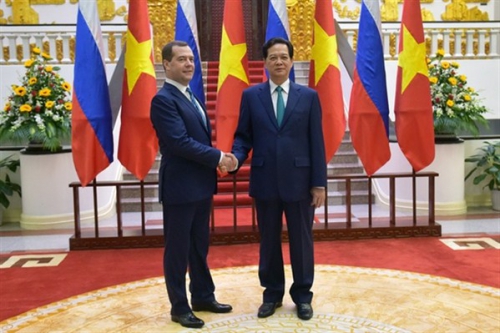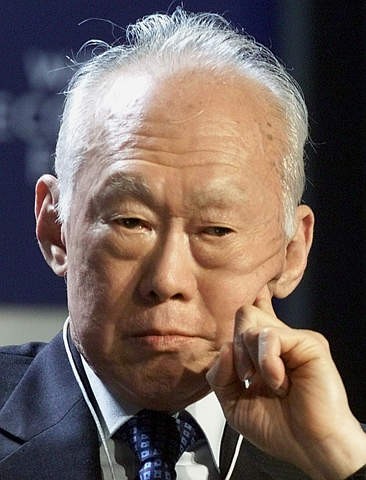Publication: Eurasia Daily Monitor
By: Stephen Blank
The Jamestown Foundation & http://moderntokyotimes.com
The Ukraine crisis has brought Russia and China much closer together (see EDM, April 3). But Russian Prime Minister Dmitry Medvedev’s trip to Southeast Asia—Thailand and then Vietnam—in early April 2015, suggests that Moscow is simultaneously hedging against China, as Beijing is visibly trying to subordinate Vietnam and other local governments to its effort to dominate the South China Sea and the region more generally.
Russia calls Vietnam its strategic partner and is expanding energy ties and defense sales to this Southeast Asian country (China Daily, April 6; Interfax, Vietnam News Agency, April 5). Hanoi even has allowed Russian planes to refuel at a Vietnamese base, from where they take off on probes against the United States (RT, March 12; Interfax, March 25). Yet, Moscow acknowledged Hanoi’s right to buy arms from anyone it wants, including the US (Interfax, March 25).
The recent Russo-Vietnamese communiqué of Prime Minister Medvedev’s visit in April opposes China’s territorial claims in Asia and shows that Russia has other friends in the region besides China (Moscow Times, April 9). The most striking and consequential forms of cooperation with these regional partners are in the military sphere. Vietnam’s defense minister, General Phung Quang Thanh, in 2013, called Russia “Vietnam’s primary strategic military partner in the sphere of military and technical cooperation” (Nezavisimaya Gazeta, August 7, 2013). Beyond Russia’s interest in the naval facilities at Cam Ranh Bay, Russia has been helping Vietnam build a submarine base and repair dockyards to provide maintenance support for other naval platforms. The submarine base will host Kilo-class subs that Vietnam bought from Russia to protect its interests in the South China Sea. More recently, both sides have begun discussing regular Russian port visits to Vietnam for maintenance, rest and relaxation—although Cam Ranh Bay will not become a Russian base. Vietnam and Russia also announced a third tranche of the sale of 12 new Su-30MK2 fighter aircraft that can target ships as well as aerial and ground targets. Furthermore, Vietnam has ordered six new Varshavyanka-class submarines that improve on its existing Kilo-class vessels and can conduct anti-submarine, anti-ship, general reconnaissance, and patrol missions in relatively shallow waters like the South China Sea. These sales display Vietnam’s defense modernization strategy to resist Chinese threats to its offshore energy interests, defend Vietnamese claims in the South China Sea, and deter growing Chinese aggressiveness.
But perhaps the most striking aspect of these recent arms sales and ministerial talks is the fact that Prime Minister Medvedev approved a draft Russo-Vietnamese military cooperation pact formalizing bilateral defense cooperation. Medvedev’s approval compels the Russian Ministry of Defense to discuss the planned accord with Hanoi and authorizes it to sign the agreement on Russia’s behalf. The planned accord would stipulate exchanges of opinions and information, the implementation of confidence-building measures, cooperation to enhance international security and ensure more effective action against terrorism, as well as better arms control.
Of course, allegedly nothing in this bilateral relationship targets a third country. However, it is noteworthy that most of these announcements come from the Vietnamese side, which has every reason to display publicly its ability to garner outside support for its military buildup and political resistance to Chinese territorial claims.
Vietnam’s efforts to weave together a series of partnerships against Chinese power are not surprising. But Russia’s activities clearly have stunned and even dismayed China. Perhaps Beijing should not have been caught unawares, as those policies are clearly part of Moscow’s overall “pivot” to Asia. Indeed, the Russian moves actually preceded the US “rebalancing” program in Asia, and they aim to invigorate Moscow’s economic-military-political position as an independent major Asian power in its own right. Moreover, they visibly confirm Edward Luttwak’s observation that, given the logic of strategy, China’s unceasing aggressive policies will lead its neighbors and other Asian states, including Russia, to find new ways of collaborating together to check those policies (Edward N. Luttwak, The Rise of China vs. the Logic of Strategy, Belknap Press, 2012).
Still, Beijing clearly dislikes Moscow’s policies. In 2012, China called them “unrighteous” and rebuked Russia for preferring to cooperate with “ill-doers” over nurturing a partnership with China—with whom Russia professes an overlap of interests. Chinese media also stressed that Russo-Vietnamese military and energy cooperation allows Vietnam to extend energy exploration into contested areas. These articles also charged that Vietnam depends on this cooperation with Russia, so in some sense Moscow is culpable. China also correctly accused Russia of seeking a return to Cam Ranh Bay—where the Soviet (and later Russian) navy used to lease a base until 2002. Thus, Russia’s “chess moves” suggest that Sino-Russian amity, at least as regards Asia’s regional security agenda, is something of a facade. Russia’s comprehensive strategic partnership agreement with Vietnam amply underscores its refusal to yield to China in Southeast Asia (China Daily, April 6).
Beyond arms sales, Medvedev’s visit to Thailand and Vietnam was also instructive from an economic viewpoint. Vietnam announced its intention to join the Eurasian Economic Union (RT April 6). Medvedev also sought Vietnamese and Thai investments in Russia and offered to sell Thailand arms in exchange for agricultural exports, no doubt to relieve Russia’s growing food crisis (Kyodo World Service, Interfax, April 8). All these moves must be seen as part of Russia’s Asian policy: specifically, it hopes to gain an independent status as an Asian great power even as it slips into dependence on China. Thus, paradoxically, even as Russia proclaims an unprecedented convergence or identity of interests with China, it is simultaneously seeking to hedge against it and restrain Chinese power in the Asia-Pacific. However, it is unlikely that this elaborate game fools Beijing.
The Jamestown Foundation kindly allows Modern Tokyo Times to publish their highly esteemed articles. Please follow and check The Jamestown Foundation website at http://www.jamestown.org/
https://twitter.com/JamestownTweets The Jamestown Foundation
Eurasia Daily Monitor Volume: 12 Issue: 80
Photo: Russian Prime Minister Dmitry Medvedev and his Vietnamese counterpart, Nguyen Tan Dung, Hanoi (Source: Reuters)





 del.icio.us
del.icio.us
 Digg
Digg